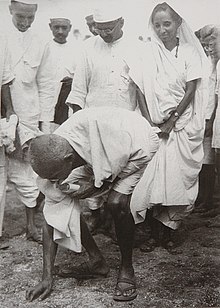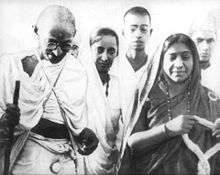മിഥുബെൻ പെറ്റിറ്റ്
മിഥുബെൻ പെറ്റിറ്റ് | |
|---|---|
| മിഥുബെൻ ഹോർമുസ്ജി പെറ്റിറ്റ് | |
 മിഥുബെൻ പെറ്റിറ്റ് | |
| ജനനം | 11 ഏപ്രിൽ 1892 ബോംബേ, ഇന്ത്യ |
| മരണം | 1973 ജൂലൈ 16 |
| ദേശീയത | ഇന്ത്യൻ |
| അറിയപ്പെടുന്നത് | ഇന്ത്യൻ സ്വാതന്ത്ര്യ സമര സേനാനി |
| പുരസ്കാരങ്ങൾ | പത്മശ്രീ |


മിഥുബെൻ ഹോർമുസ്ജി പെറ്റിറ്റ് (11 ഏപ്രിൽ 1892 – 16 ജൂലായ് 1973) ഒരു ഇന്ത്യൻ സ്വാതന്ത്ര്യ സമര സേനാനിയും,[1][2] മഹാത്മാഗാന്ധിയുടെ ഉപ്പുസത്യാഗ്രഹത്തിൽ പങ്കെടുത്ത വനിതയുമായിരുന്നു.[3][4]
ജീവിതം
[തിരുത്തുക]1892 ഏപ്രിൽ 11 ന് ബോംബേ (ഇപ്പോൾ മുംബൈയിൽ) വളരെ സമ്പന്നമായ പാഴ്സി കുടുംബത്തിൽ ജനിച്ചു. അച്ഛൻ സർ ഡിൻഷാ മാനേക്ജി പെറ്റിറ്റ്, പ്രശസ്ത വ്യവസായിയും ബറോണെയും ആയിരുന്നു.[5][6]
ഇന്ത്യൻ സ്വാതന്ത്ര്യസമരം
[തിരുത്തുക]ഗാന്ധിജിയുടെ അനുയായിയും രാഷ്ട്രീയ സ്ത്രീ സഭ സെക്രട്ടറിയും ആയിരുന്ന അമ്മയുടെ അമ്മായി പെറ്റിറ്റിനെ വളരെയധികം സ്വാധീനിച്ചു.[7] കസ്തൂർബാ ഗാന്ധി, സരോജിനി നായിഡു എന്നിവർക്കൊപ്പം പെറ്റിറ്റും 1930 മാർച്ച് 12 ന് സബർമതി ആശ്രമത്തിൽ നിന്നും ആരംഭിച്ച ഉപ്പുസത്യാഗ്രഹത്തിൽ ഒരു പ്രധാന പങ്കുവഹിച്ചു.[8] ഇന്ത്യൻ സ്വാതന്ത്ര്യ സമരത്തിലെ ഏറ്റവും പ്രധാനപ്പെട്ട സംഭവമായിരുന്നു ഇത്.[1]
1928 ലെ ബർദൊളി സത്യാഗ്രഹത്തിൽ പെറ്റിറ്റ് പങ്കെടുത്തത് ബ്രിട്ടീഷ് രാജിനെതിരായ ഒരു നിതാന്ത നികുതി പ്രചരണമായിരുന്നു. അവിടെ സർദാർ പട്ടേലിന്റെ നേതൃത്വത്തിലാണ് പ്രവർത്തിച്ചിരുന്നത്.[9] പെറ്റിറ്റ് ഇന്ത്യയിലെ മദ്യ വിരുദ്ധ പ്രസ്ഥാനത്തിൽ പ്രധാന പങ്കു വഹിച്ചു. മഹാത്മാഗാന്ധിയുടെ കൂടെ സമയം ചെലവഴിക്കുകയും, ഗുജറാത്തിലെ പട്ടികവർഗ വിഭാഗക്കാർക്ക് മദ്യത്തിന്റെ പ്രശ്നം വിശദീകരിക്കുകയും ചെയ്തു.[10]
സാമൂഹിക പ്രവർത്തനം
[തിരുത്തുക]മാരൊലിയിൽ കസ്തൂർബ വാനത്ത് ശാല എന്നു പേരുള്ള ഒരു ആശ്രമം സ്ഥാപിച്ചത് പെറ്റിറ്റ് ആയിരുന്നു.[11] മാനസിക രോഗികളുടെ ചികിത്സയ്ക്കായി അതേ പേരിൽ തന്നെ ഒരു ആശുപത്രി ആരംഭിച്ചു.[12]
1961 ൽ തന്റെ സാമൂഹ്യപ്രവർത്തനത്തിനായി പെറ്റിറ്റിന് പത്മശ്രീ ലഭിച്ചു.[13][14]
1973 ജൂലായ് 16 നാണ് പെറ്റിറ്റ് അന്തരിച്ചത്.[6]
അവലംബം
[തിരുത്തുക]- ↑ 1.0 1.1 Nawaz B. Mody (2000). Women in India's freedom struggle. Allied Publishers. ISBN 9788177640700.
- ↑ Kamla Mankekar (2002). Women pioneers in India's renaissance, as I remember her: contributions from eminent women of present-day India. National Book Trust, India. ISBN 978-81-237-3766-9.
- ↑ "Mahatma Gandhi, Sarojini Naidu and Mithuben Petit". gandhiheritageportal.org. Retrieved 2017-07-02.
- ↑ Simmi Jain (2003). women pioneers in India's resistance. Kalpaz Publications.
- ↑ Marzban J. Giara (2000). Parsi statues. Marzban J. Giara.
- ↑ 6.0 6.1 Gawalkar, Rohini (2013-09-28). "पद्मश्री 'दीनभगिनी'". Loksatta (in മറാത്തി). Archived from the original on 2017-07-28. Retrieved 2017-07-28.
{{cite news}}: Cite has empty unknown parameter:|dead-url=(help) - ↑ Suruchi Thapar-Björkert (2006). Women in the Indian national movement : unseen faces and unheard voices, 1930-42. SAGE Publications India Pvt Ltd. ISBN 9789351502869.
- ↑ "The Great Dandi March – eighty years after". thehindu.com. Retrieved 2017-07-02.
- ↑ "Encyclopaedia of Indian Women Through the Ages: Period of freedom struggle".[full citation needed]
- ↑ "anti-liquor movement". mkgandhi.org. Retrieved 2017-07-03.
- ↑ "Trustees". Kasturbasevashram.org. Archived from the original on 2018-01-03. Retrieved 20 July 2017.
- ↑ "Kasturba Sevashram". kasturbasevashram.org. Archived from the original on 2018-06-12. Retrieved 2017-07-20.
- ↑ "Padma Shri in 1965 for social work". padmaawards.gov.in. Archived from the original on 28 ജൂലൈ 2017. Retrieved 2 ജൂലൈ 2017.
- ↑ "Mithuben Petit Padma Shri" (PDF). pib.nic.in/archive/docs. Archived from the original (PDF) on 28 ജൂലൈ 2017. Retrieved 6 ജൂലൈ 2017.
പുറത്തേയ്ക്കുള്ള കണ്ണികൾ
[തിരുത്തുക]- Kasturba Sevashram Archived 2017-07-12 at the Wayback Machine.




